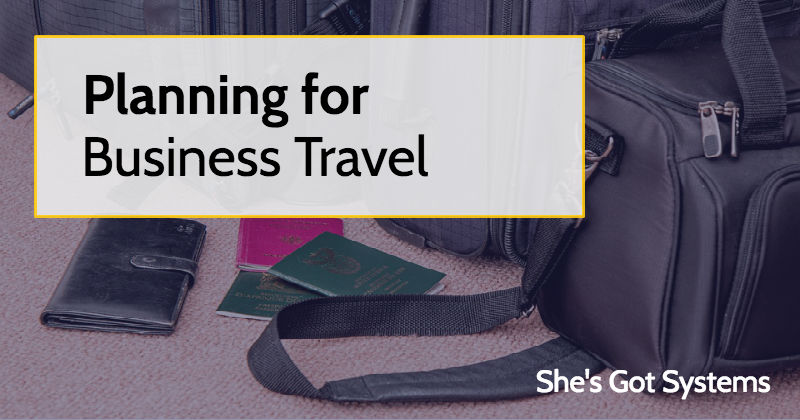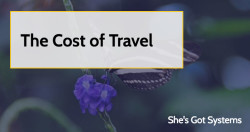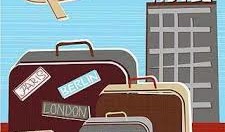A few weeks ago I shared how I make the most of travel by building in time to re-energize so I don’t get burned out. Without these little strategies, I would often return from a trip exhausted and promising myself 3 months at home before the next adventure.
Now, I travel much more frequently and enjoy it more, so today I want to share how I prepare my business and myself for an upcoming trip so I don’t add any stress.
Tip #1 Plan a month in advance
You might be one of those people who can put a flight on your calendar next week and worry about how you’re going to get home later, but I am absolutely not that way! By working at least a month in advance, I can see all the options, make reservations and feel ready to go. Your own time buffer might differ, but figure out how far out you need to plan so you’re not scrambling, stressed, and running on pure adrenaline.
Tip #2 Set your preferences
A lot of business travelers have loyalty cards and programs and that’s great – when I was traveling more frequently, I joined The Regal Card which gave me access to members only lounges in airports all over the world so I nearly always have a place to relax, get free wifi, and take a shower during layovers.
But I also want you to note your personal preferences: 2 queen beds or a king? Smoking or non-smoking? Window seat or aisle? Favorite airport? Rental car preference?
Consider things like how early you like to depart and how late your return flight will land – especially if you have a spouse or friend doing airport drop off and pick up. You can even note when you prefer a business or first class flight and other add-ons.
I’m sure you already know these things but writing them all down in a handy travel preferences checklist makes remembering or outsourcing all these details easier.
Tip #3 Create a packing plan
I am not the lightest of travelers and often curse that fact when I’m dragging my suitcase through security. No matter how much you haul, start with a packing list that does the job of remembering all those things you would otherwise forget to bring along.
My own list gets an update after each trip when I realize, belatedly, that I don’t really need that many pairs of shoes.
My list is divided into 3 parts: clothes, toiletries and electronics because you really don’t want to be stuck with no charger for your phone or headphones for a 6-hour flight.
Since some items will be used right up until I pack the car, I use Post-It notes to denote everything that needs to go in last minute and then throw the note away when the laptop or my wallet make it into the bag.
Clothes are always the hardest, especially for business travel that will include a few days of fun. For this I turn to the blog Outfit Posts for awesome “one suitcase” packing lists for a variety of locations. Here’s an example for a beach getaway which, with a few substitutions, works great for a business retreat at the ocean. Having a capsule wardrobe helps, but also seeing ways to pack fewer, more versatile items has helped me pare down and stop bringing my whole closet on a trip.
(Sorry guys, I have no idea where menfolk go for packing inspiration!)
You can also include things that make being in transit easier; for me that includes a water bottle with built in filter to fill up after going through security and some travel-friendly snacks like dried edamame or dehydrated fruit. If you need a travel pillow or other amenity, add it to your list.
Tip #4 Clear the calendar, strategically
Typically when I’m traveling I do not like to teach, do client calls, or attend meetings, so once a trip is confirmed on my calendar, my assistant and I keep it clear of other commitments (a benefit of planning a month in advance).
Depending on the nature of the trip, I’ll also look for ways to work ahead, such as planning the blog if I’ll be on the road Monday when I typically write or rescheduling team check-ins.
A few weeks ahead of a trip I’ll notify any clients who need to know that I’ll be unavailable and make sure they know to contact my team in my absence.
Other things that help are setting an away message with my date of return, how to get support while I’m gone, updating my voicemail greeting before leaving, and holding mail deliveries until I return so packages don’t pile up by the door. I’ll also pre-pay any bills that will come due or set them up in autopay through my bank so I don’t incur any fees.
Speaking of banks, if I plan to use my bank or credit card at all during my trip I’ll notify those companies of where I’ll be traveling and the dates. I’ll never forget having my card frozen in New York City when they found it suspicious that an autobill was processed in San Francisco at the same time! Even if I plan to use cash and local currency, I’ll take this step in case I need to make a withdrawal. If you’re traveling to another country, it helps to know the exchange rate and fees for international transactions.
All these little things help me relax, knowing the business is taken care of before I get on that flight. Sure, things pop up and we handle them, but it’s much less stressful this way.
Tip #5 Clean the house
While this may not work for those of you who leave family members or roommates at home, for me leaving with a clean house pays off when I return. Instead of walking into chaos, I have a clear and clutter free space to welcome me back.
Besides, unpacking immediately causes chaos, so it’s just easier if the house looks good when I walk in. The first few days home are usually filled with laundry, unpacking, restocking the fridge, and promising my dogs that I’m not going to leave again soon, so they can stop following me.
I’ll update my travel packing list based on the items I brought back unused and send off any gifts I brought home, like the recent trio of maple syrup from Toronto or the coffee and chocolate from Mexico.
If your home is not clean and calm due to roommates or small children, then focus this attention on your office space. Let that room or desk be the one place that is clear and ready for you when you get home.
Finally, be willing to adapt the plan as you go. The more you travel, the more these systems will become second nature as you discover what tools you love and which are unnecessary. Travel can often be stressful because we’re away from our usual environments, resources and wifi; having these systems in place means more things I don’t need to worry about when I’m on the road.
What do you put in place before your business or personal travels? Share with me in the comments!

 The Cost of Travel
The Cost of Travel Tales from Traveling
Tales from Traveling Travel Systems
Travel Systems